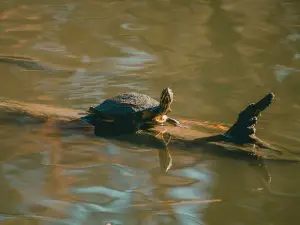
Tortoises can be quite vocal, many don’t know that these reptiles can be vocal but they will make sounds including sounds of crying at night.
This article looks into why your baby tortoise is crying at night
Table of Contents
Baby tortoise crying noise at night. sick?
While tortoises can cry, their crying isn’t the same as humans crying.
Here is why your baby tortoise may cry at night while sick:
Tortoise crying:
Tortoises will not cry because they feel a deep sadness, they cry while mating, when there is debris in their eyes, as a way of cleaning their eyes, and, they will cry if they have a respiratory infection.
It is unlikely that your baby tortoise is mating. If your pet is not only crying, but is also acting sick, then your pet is likely crying because it is suffering from a respiratory infection.
Respiratory infection in tortoises:
Respiratory infections are quite common in tortoises and may be the reason why your pet tortoise is crying.
Symptoms of this condition in your pet include a watery discharge from the nostrils, mouth, and eyes. The watery discharge from the animal’s eyes may be what you see as crying.
Other signs of a respiratory infection, that indicate that the animal is sick, include difficulty breathing, gulping for air, a lack of appetite, unable to dive, swimming lopsided, whistling while breathing, and open mouth breathing,
This is quite a serious condition and if this condition in your pet is not addressed then it can turn into pneumonia and this can be life-threatening.
What to do:
Your pet may not seem too sick right now but their condition can become life-threatening if it turns into pneumonia so treating your pet is a must
Taking your baby tortoise to the vet, or better yet to the herp vet, is recommended. The vet will figure out what is wrong with your little pet through lab work, this lab work will determine which type of bacteria caused this infection.
The antibiotics that your pet will be given will be determined by which bacteria infected your pet.
The vet may also suggest changes to your pet’s environment to keep the infection at bay.
If you can’t immediately get your pet to the vet then you can isolate it. Isolating your pet until you can get it to the vet is recommended, this will keep the infection from spreading.
Increasing the temperature and humidity of your pets enclosure should help the animal fight the infection somewhat until it can get to the vet.
If you enjoyed this article then you may also be interested in other turtle/tortoise related articles. Here are some articles that you may be interested in: Why Is My Turtle Making Clicking Noises?, Tortoise Making Whistling Noise When Eating, Tortoise Clicking Jaw, Tortoise Swollen Neck, Tortoise Making Whistling Noise, Tortoise Gasping, Baby Tortoise Gasping, Why Is My Tortoise Squeaking At Night?, Sulcata Tortoise Making Clicking Noise

